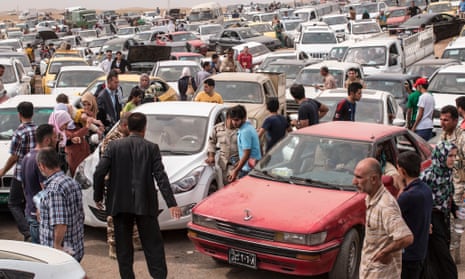The US on Tuesday pressed for a strong response to push Islamic extremists out of Mosul, Iraq's second largest city, as a sudden withdrawal of Iraqi government forces from the city led the White House to question whether prime minister Nouri al-Maliki was doing enough to hold his country together.
The White House called on the Iraqi government to “step up to the plate” and do more to address political concerns across the country after the fall of Mosul to forces from the Islamic State of Iraq in Syria (Isis) – also known as Islamic State of Iraq and the Levant (Isil) – left officials in Washington warning of an “extremely serious” threat that could impact the entire region.
“The United States is deeply concerned about the events that have transpired in Mosul over the last 48 hours where elements of the Islamic State of Iraq (Isil) have taken over significant parts of the city,” added the State Department in a statement.
“Isil continues to gain strength from the situation in Syria, from which it transfers recruits, sophisticated munitions, and resources to the fight in Iraq … Isil is not only a threat to the stability of Iraq, but a threat to the entire region.”
The US administration also pledged to continue to supply weapons and other advanced military equipment to Iraqi security forces, and to provide “all appropriate assistance”.
But in comments that may strain relations with Baghdad, the White House made clear it believed Maliki's Shia-led government was partly to blame for his forces' lack of support in other areas of the country.
White House spokesman Josh Earnest said the US was encouraging “all Iraqi leaders including Prime Minister Maliki to do more to address unresolved issues to better meet the needs of all the Iraqi people”.
“We are going to continue our important relationship in terms of providing some security assistance to the government of Iraq but ultimately there is a responsibility on behalf of the Iraqi leaders to step up to the plate here, that includes prime minister Maliki,” he told reporters in Washington.
The sudden collapse of resistance in Mosul has alarmed many in Washington, where Obama has been criticised for failing to do more to ensure ongoing security in Iraq and Afghanistan after his decision to withdraw US troops first sent into both countries under president George W Bush.
Officials insist the US retains responsibility to help with security and has an “enduring relationship” that has provided substantial military resources already this year.
“Our shipments have included delivery of 300 Hellfire missiles, millions of rounds of small arms fire, thousands of rounds of tank ammunition, helicopter-fired rockets, machine guns, grenades, sniper rifles, M16 and M4 rifles to the Iraqi security agencies,” said Earnest.
“We remain engaged in an ongoing discussion with the Iraqi government on how we can continue to support Iraq's counter-terrorism effort … our response to Iraqi requests for expedited deliveries of defence articles since the Anbar crisis began in January has been rapid, comprehensive and is continuing.”
However, Earnest would not discuss the effectiveness of Iraqi troops, which were trained and equipped by the Americans to deal with counter-insurgencies of this type.
“I am not in a position to comment on their military capabilities. We do still feel like we have a partner there that we can work with in terms of security cooperation,” added Earnest. “That relationship continues notwithstanding what it a serious deterioration in the security condition in at least one province.”
While directing their criticism primarily at the Isis forces that have taken control of Mosul and parts of other cities such as Falluja and Ramadi, US officials also made little acknowledgement of their own role in the country's recent past.
“It is too much to say the Iraqi government has brought this upon itself. We condemn in the strongest possible terms this aggression we are seeing,” said Earnest.
“A lot of this aggression is targeting innocent Iraqi people, it's despicable, and we stand with the Iraqi people as they fight it but, that said, there is more that can be done by all of the political leadership in Iraq including Prime Minister Maliki to better reflect or to better represent the needs of all of the Iraqi people and to address some of the unmet needs and concerns that have been expressed by the citizens there.”

Comments (…)
Sign in or create your Guardian account to join the discussion